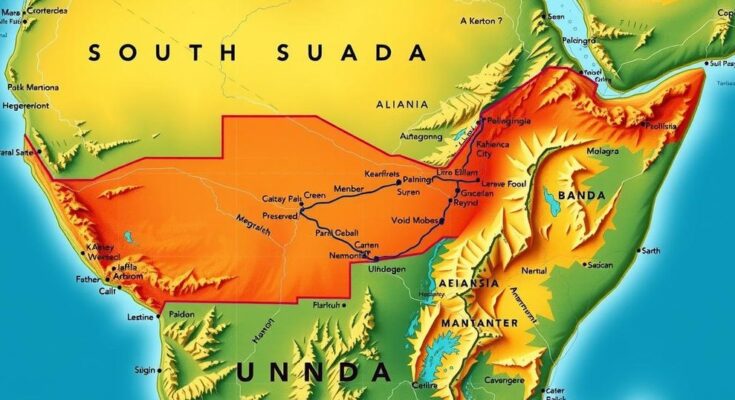South Sudan grapples with its relationship with Uganda, marked by historical connections and political challenges. Despite Uganda’s supportive role during the independence struggle, military involvement has sparked tensions and conflicts. Economic competition complicates this relationship, necessitating a focus on governance, diversifying partnerships, and addressing internal challenges to enhance national sovereignty and regional stability.
South Sudan stands at a critical juncture, managing its complex relationship with neighboring Uganda, a country with which it shares historical ties yet diverging political interests. These factors bear significant implications for stability and economic development within South Sudan and the broader region.
Since gaining independence on July 9, 2011, Ugandan support was pivotal during South Sudan’s struggle, as it provided military aid to the Sudan People’s Liberation Army (SPLA) against the Sudanese government, often justifying its involvement as part of the fight against the Lord’s Resistance Army (LRA) within Uganda.
The relationship has been characterized by both collaboration and rivalry; South Sudan serves as a market for Ugandan goods, while Uganda has been instrumental in facilitating peace initiatives through bodies such as the Intergovernmental Authority on Development (IGAD). Furthermore, Uganda has established essential trade routes that are vital for South Sudan’s economy.
However, Uganda’s military role in South Sudan became contentious during the civil war that erupted in December 2013, with its troops backing President Salva Kiir’s administration against opposition forces. This military intervention heightened tensions and contributed to significant loss of life and infrastructure, with devastating impacts particularly in conflict-affected areas, leading to a humanitarian crisis and widespread displacement.
Although a peace agreement was reached in 2018, South Sudan remains politically fragmented and grappling with governance challenges. This delicate situation has transformed Uganda-South Sudan relations into a complex interplay of geopolitics, as both countries have intervened in conflicts in neighboring nations such as the Democratic Republic of Congo and Somalia, often breaching international laws.
Uganda’s alignment with President Kiir has led to tensions within South Sudan, as opposition factions accuse it of exacerbating existing divisions. The situation has further entangled South Sudan in a regional power struggle involving nations like Sudan and Ethiopia, which support various opposition groups.
Economic competition also characterizes the Uganda-South Sudan relationship. The nations’ shared border is crucial for trade, with Uganda having developed infrastructure for oil pipelines that could connect South Sudan’s oil resources to Ugandan markets. However, competition for resources is likely to heighten tensions between the two nations.
International scrutiny of Uganda’s involvement in South Sudan’s oil sector has grown, as it seeks investment opportunities in regions rich in oil reserves amidst infrastructure challenges. Both countries must seek to manage their relationship wisely to prevent conflicts that could jeopardize mutual interests.
South Sudan’s strategic location in the Horn of Africa positions it as a significant partner for global powers interested in the region’s natural resources. The influence of external actors, including the U.S., China, and Russia, adds another layer to its geopolitical importance, while Uganda benefits from maintaining a stable South Sudan to secure its own borders and regional standing.
Uganda’s close ties with Kiir’s government, however, have sparked criticism from nations like Sudan, which has historically faced challenges with South Sudan and may support opposition factions. Additionally, the role of international organizations such as the United Nations and the African Union has urged Uganda to adopt a neutral stance to promote dialogue among all factions.
To effectively manage its relations with Uganda, South Sudan must develop a coherent diplomatic strategy that promotes national sovereignty and stability while engaging with Uganda economically and militarily. Avoiding dependence on any single nation, particularly Uganda, is vital to preventing entanglement in external conflicts.
Strengthening relationships with regional powers such as Ethiopia and Kenya could also help diversify South Sudan’s international partnerships. Critical governance challenges must be addressed to reduce foreign interference and ensure South Sudan remains resilient against external pressures. Ultimately, inclusive governance and meaningful peacebuilding are essential for South Sudan to assert its sovereignty in the face of regional politics.
In conclusion, South Sudan must navigate its complex relationship with Uganda by fostering cooperative ties and strategic partnerships, particularly with regional actors, to ensure stability and avoid dependency. Critically addressing governance challenges will mitigate external influences and help solidify its sovereignty amidst regional dynamics. An inclusive approach to peacebuilding stands as the cornerstone for a stable and independent South Sudan.
Original Source: www.radiotamazuj.org




